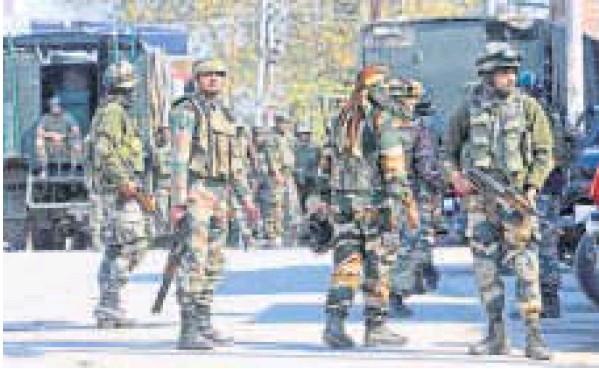Terror attacks resume in J&K a day after India, Pakistan agree on truce
Date:- 02 Jun 2018

Despite the two countries deciding to abide by a 2003 ceasefire pact, intelligence officials don’t see any possibility of a reduction in terrorism in J&K
Terror attacks resumed in Kashmir a day after India and Pakistan decided to implement the 2003 ceasefire agreement in “letter and spirit”, with militants lobbing grenades at a police party in Pulwama district, security force officials said.
A file photo of security personnel in Kashmir. A police party came under grenade attack in Pulwama district on Wednesday.
Senior intelligence officials, as well as defence experts, dismissed the possibility of a reduction in terrorism in Kashmir valley, despite the ceasefire agreement.
“This is not going to impact terrorism in Kashmir at all. While ceasefire violations by Pakistan are a form of cover fire given to infiltrators, infiltrations may come down only marginally. But we have enough local militants from the Hizbul Mujahideen and Lashkar-e-Toiba (LeT) holed up Kashmir to keep the forces busy,” said an intelligence official, seeking anonymity.
Intelligence experts said that while the ceasefire agreement was an “outcome of both countries now falling short on ammunition and strength”, the pressure on the Pakistan army’s manpower was also a factor.
“Pakistan needs this agreement now because of the pressure it faces on its western front, along the Durand line (the 2,430km border between Pakistan and Afghanistan) as well as Waziristan, where its troops are stationed. At the moment, Pakistan is also facing global pressure with regard to terrorism and this is an important step that needed to be taken by it,” said the officould cial quoted above.
The centre has recorded more than 1,100 ceasefire violations so far this year along the Line of Control manned by the Indian Army, as well as the international border between India and Pakistan manned by the Border Security Force.
Defence experts said the situation was on the “precipice of turning calamitous.”
“It was becoming a disaster because in the entire stretch from Akhnoor to Kathua in Jammu and Kashmir, more than 80,000 people have been displaced because Pakistan has, by design, targeted the Hindu villages. This in itself have led to a war-like situation. But this ceasefire has now been done to save civilians,” said Lt General (retd) H.S. Panag, former Indian Army officer and defence expert.
The original 1949 Karachi agreement signed by India and Pakistan had representatives of the United Nations monitoring the ceasefire. In 2003, four years after the Kargil conflict, both countries had once again signed ceasefire agreement, which was observed till 2008.
“By 2011, the ceasefire line flared up in a big way. By 2014, we started retaliating aggressively in the Samba sector of Jammu and Kashmir. Both sides targeted villages. It is not Pakistan alone which is to blame for the tensions. India has been equally aggressive and Pakistan has been responding suitably,” Panag said.
Other experts said that it was a matter of time before the agreement was flouted again.
“Pakistan does not have the institution to back up its peace talks and there is no constitutional guarantee either that they will not violate the ceasefire agreement once more. This is temporary before the next Pakistan army chief decides to change tact,” said Gaurav Arya, a former Indian Army officer and defence expert.
Shaswati Das shaswati.d@livemint.com NEW DELHI
Courtesy: Mint: 31 May 2018


